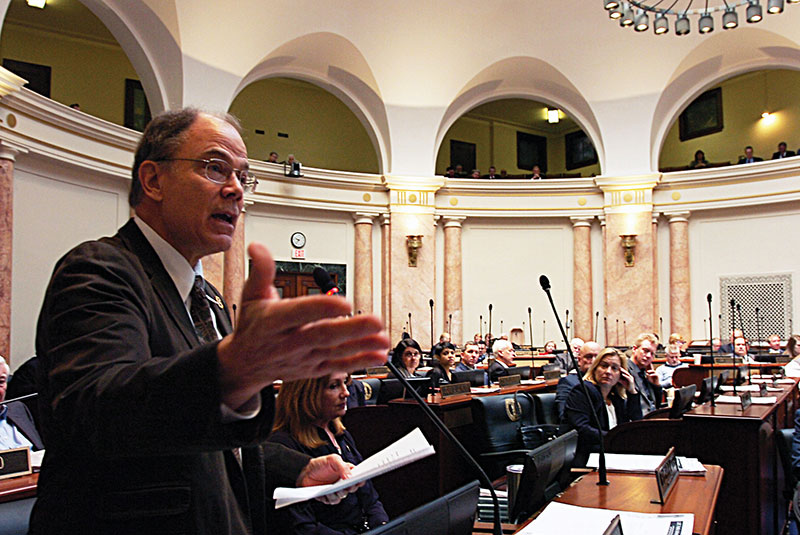PUBLIC POLICY

Fifty years ago, Kentucky was widely praised by policy experts, political science professors and the press on the subject of money. The reason was simple, but original: The state had a two-year budget.
In that era, the legislature met only every two years, so thinking two years ahead was clearly required. Hailed as a novel tool for long-range planning joined to fiscal management, the Bluegrass budget process earned widespread kudos.
Then, up came COVID-19 and down went the budget model. The seven-part budget, which includes spending for the courts, the legislature, roads, and every service from state police to parks and education, was set for one year only instead of the traditional two.
As the 2020 legislative session wrestled with the normal challenges of getting the budget finished in the even years, balancing public pension payments with schools, universities and myriad highway needs, the pandemic changed the picture. There was no way to know for certain how large the revenue shortfall would be.
Now we know. In a nutshell, the quarter ending in June is short by $69 million. For the year, the state will be off 1.8%, which doesn’t sound like a lot, but original projections were for growth, not loss. The road fund got crunched the most, since few were driving or filling up, ultimately not paying their pennies of the gas tax.
So where does all this leave the budget process? In simple terms, 2020 was a different budget year. Now 2021 will require a one-year budget plan as well. Then, the expectation is that 2022 will produce a budget for 2022-24.
Budgeting is a permanent piece of the job description for state officials, now more than ever. John Hicks, the state budget director, and his team of experts are always refiguring the numbers, nailing down the dollars. Hicks’ prior experience as head of the National Association of State Budget Officers association gives him uncommon qualifications.
In January, the short session of the legislature will be the 11th since the amendment mandating annual sessions passed in 2000. The first short sessions spent as much time reviewing state issues as making law. Now short sessions have the feel and pace of long sessions. Virtually every topic comes up.
The authors of the constitutional provision, then-Senate President David Williams and then-House Speaker Jody Richards, were of different parties but of the same mind in selling the annual sessions. To answer the concern that short sessions would create more spending, they limited budget issues by requiring a super majority for approval.
This has worked as planned, severely shutting off fiscal matters from short session action. “Wait for the budget year,” is practically a rule.
The 2021 edition will be packed, based on the number of subjects already under review. With the pressure of another budget, the dynamics change even further.
- IT’S FREE | Sign up for The Lane Report email business newsletter. Receive breaking Kentucky business news and updates daily. Click here to sign up
Key questions loom. It is assumed the executive branch budget will be a starting point, just like always. The legislature convenes Jan. 5 for just four days. Will Gov. Andy Beshear address a joint session to present his budget along with Lt. Gov. Jacqueline Coleman in that first short week?
In a usual short session, the three weeks following the opening are used to “get ready” for action. Will this period in 2021 be budget hearings?
The two budget chairs have major responsibility year-round to measure and monitor income and spending. Sen. Christian McDaniel and Rep. Steven Rudy carry this heavy duty constantly, wielding strong authority. Their joint interim committee could assume a more intense look ahead over the course of the summer and fall.
Top leaders continuously weigh budget needs. House leaders, Speaker David Osborne and Rep. Joni Jenkins, along with Senate leaders President Robert Stivers and Sen. Morgan McGarvey, must guide crucial considerations under a heavy deadline this time.
In asking key leaders for perspective on 2021, Majority Floor Leader Sen. Damon Thayer made it clear that the two-year budget is not dead. “The two-year budget provides stability for every agency and interest—corrections, education, postsecondary education—for better planning opportunities,” Thayer said. Thayer won national recognition for pension reform several years back.
Pensions are a permanent issue in the constant worry over money. Rep. Joe Graviss, in his first term, spent numerous days and nights on the mammoth pension-funding puzzle. “We have to wrestle through these difficult times, and make sure we continue funding our obligations,” Graviss said.
The consensus is that the two-year budget will make a comeback. In the meantime, budget anxiety, rewriting and redoing is day to day. ■
Bob Babbage and Julie Babbage are with Babbage Cofounder, a leading government relations firm.




















Add Comment